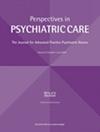The Indirect Effect of Depression between Nightmares and Well-Being in Lebanese Patients with Schizophrenia
IF 1.9
4区 医学
Q2 NURSING
引用次数: 0
Abstract
Background. Because nightmares seem to be associated with depression in schizophrenia, detecting them early in therapeutic practice might be critical to ensuring effective avoidance of the development of depressive symptomatology. This helps promote well-being and improve the patient’s quality of life and illness prognosis. Therefore, the aim of this study was to examine the indirect effect of depression between nightmares and well-being in a Lebanese sample of patients with schizophrenia. Method. This monocentric cross-sectional study, conducted in July 2022, enrolled patients with chronic schizophrenia admitted to the Psychiatric Hospital of the Cross. Data were collected from a total of 148 participants through face-to-face interviews. The questionnaire included a nightmares measure, PSYRATS, Calgary depression scale for schizophrenia, PTSD checklist for DSM-5, the digit span subset, and WHO-5Well-Being Index. Results. The presence of nightmares was significantly associated with more depression, whereas higher depression was significantly associated with lower well-being. It is noteworthy that the presence of nightmares was not directly associated with well-being. Conclusion. Nightmares lead indirectly to lower well-being in schizophrenia patients, with depression serving as a mediating factor in this association. This suggests that interventions aiming at improving dream content may also have a beneficial effect in reducing depression in schizophrenia leading therefore to better well-being of the patients.黎巴嫩精神分裂症患者噩梦与幸福感之间抑郁的间接影响
背景由于噩梦似乎与精神分裂症患者的抑郁有关,在治疗实践中尽早发现噩梦可能对确保有效避免抑郁症状的发展至关重要。这有助于促进健康,改善患者的生活质量和疾病预后。因此,本研究的目的是在黎巴嫩精神分裂症患者样本中检验抑郁在噩梦和幸福感之间的间接影响。方法这项单中心横断面研究于2022年7月进行,招募了入住十字精神病医院的慢性精神分裂症患者。数据是通过面对面的访谈从总共148名参与者中收集的。该问卷包括噩梦测量、PSYRATS、精神分裂症卡尔加里抑郁量表、DSM-5 PTSD检查表、数字跨度子集和WHO-5健康指数。后果噩梦的出现与更多的抑郁情绪显著相关,而更高的抑郁情绪与更低的幸福感显著相关。值得注意的是,噩梦的存在与幸福感没有直接联系。结论噩梦间接导致精神分裂症患者幸福感下降,抑郁症是这种关联的中介因素。这表明,旨在改善梦境内容的干预措施也可能在减少精神分裂症患者的抑郁方面产生有益效果,从而改善患者的健康状况。
本文章由计算机程序翻译,如有差异,请以英文原文为准。
求助全文
约1分钟内获得全文
求助全文
来源期刊
CiteScore
5.00
自引率
4.30%
发文量
139
审稿时长
>12 weeks
期刊介绍:
Perspectives in Psychiatric Care (PPC) is recognized and respected as THE journal for advanced practice psychiatric nurses. The journal provides advanced practice nurses with current research, clinical application, and knowledge about psychiatric nursing, prescriptive treatment, and education. It publishes peer-reviewed papers that reflect clinical practice issues, psychobiological information, and integrative perspectives that are evidence-based. Perspectives in Psychiatric Care includes regular columns on the biology of mental illness and pharmacology, the art of prescribing, integrative perspectives, and private practice issues.

 求助内容:
求助内容: 应助结果提醒方式:
应助结果提醒方式:


